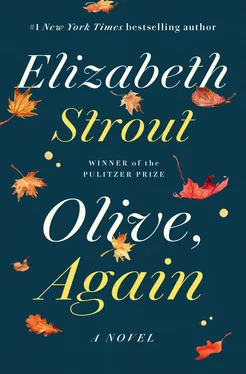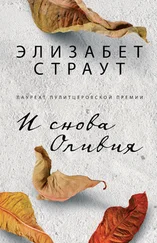“Horrible,” said Olive, and the woman agreed that it was difficult.
Mousy Pants spoke quietly, and Olive asked her if she could speak up. “I can’t hear you,” Olive said, leaning forward in her chair.
Mousy Pants said, “Yes, I’m sorry.”
And Olive said, “Oh, for God’s sakes, there’s no reason to be sorry, I’m just asking if you can speak up .”
Mousy Pants sat forward herself then, and she began to talk. She talked without stopping, and Olive found herself becoming extremely interested in everything she said. The woman said this: She said her name had originally been Isabelle Goodrow, and as a girl she had become pregnant by her father’s best friend. This was not long after her father had died. She was an only child, and she had been very protected, and she had known—she said this looking at Olive directly—nothing about sex at all. And so this happened. The man was married and lived in California with his family, and he had come back to the small town in New Hampshire where Isabelle and her mother were living to visit. And when he left she was pregnant. Her mother had taken her to the Congregational minister, who had said that God’s love worked in mysterious ways, and so Isabelle, who graduated from high school just about this time, had the baby and stayed home with her mother, and she took some courses at the university but her mother died, and then she was alone with the baby. And she felt very ashamed. “Back then, people did,” Isabelle said. “I mean, people such as myself. Very ashamed.” She sat back.
Olive said, “Go on.”
After a moment Isabelle sat forward again and said that she had packed everything up one day and driven up the coast to Shirley Falls, Maine.
“I told you I went to high school in Shirley Falls,” Olive interrupted. “I came from the little town of West Annett and I went to high school there, and so did my husband.” Isabelle waited, her swollen fingers draped over the top of her cane. Olive said, “Okay, keep going. I won’t stop you again.”
Well, said Isabelle, she knew no one in that town when she first arrived, and she guessed that was the point. But she was very lonely. She found a babysitter for her little girl, and she got a job working in the office room of a shoe factory, she was the secretary to the man who ran that department, and the room was filled with women. “I thought I was better than they were,” Isabelle said. “I really did. For years, I worked with these women, and I thought, Well, my grades in high school were very good, I would have been a teacher if I’d not had Amy, and these women could never be teachers. I would think things like that,” she said, and she looked directly at Olive again.
Olive thought: By God, she’s honest.
The women in the office room, though, turned out to be real friends. When Amy was sixteen years old, there was a crisis. Isabelle found out that Amy had been having a relationship with her math teacher. “A sexual one,” Isabelle said. Isabelle had become furious. “Do you know what I did?” She looked at Olive, and Olive saw that the woman’s eyes were smaller and becoming red.
“Tell me,” Olive said.
“Amy had always had beautiful hair. Long, wavy yellow hair, her father’s hair, not mine, and when I found out about that math teacher—Olive, I walked into that girl’s bedroom with a pair of shears—and—and I cut her hair off.” Isabelle looked away and took her glasses off and drew a hand across her eyes.
“Huh.” Olive considered this. “Well, I guess I can understand,” she said.
“Can you?” Isabelle looked at her, putting her glasses back on. “I can’t. Oh, I mean I did it, so I should understand it, but, oh, the memory haunts me, what a thing to do to that child!”
“Does she like you now?” Olive asked.
And Isabelle’s face broke into gladness. “Oh, she loves me. I don’t understand how she can, I really was not a good mother, I was so quiet and she had no friends, but yes, she lives in Des Moines now, and she has one son who is thirty-five and living in California doing computer stuff. But yes, Amy does love me, and she’s the reason I can afford this place.”
Olive asked to see a photograph of the girl, and Isabelle pointed behind Olive, and Olive turned around and saw a whole array of photos. The girl was much older than Olive would have pictured, but then she remembered how young Isabelle was when she had her. Amy wore her grayish hair short now, but her face was full and had a sweetness to it. “Huh,” Olive said. She looked at the photos carefully.
“Well, I wasn’t a good mother either,” Olive said, turning back to face Isabelle. “But my son loves me. Now. After I had my heart attack he seemed to grow up.” She said, “What does Amy do?”
Isabelle said, “She’s a doctor. She’s an oncologist.”
“My word,” Olive said. “Well, that’s something. Working with cancer patients all day, my goodness.”
“Oh, I think it has to be very hard, but she seems to find it fascinating. You know, her first little boy, he died when he was eighteen months old. Not of cancer. SIDS. And she was in nursing school, and then she just kept right on going. She’s married to a doctor as well. He’s a pediatrician.”
Somehow Olive found this astonishing. She said, “Well, my son is also a doctor, in New York City.”
“New York!” Isabelle said, and asked what kind of doctor he was.
“A podiatrist,” said Olive. Adding, “People walk a lot in New York. He has a blazing practice.” She looked over at the many little figurines that were on a shelf by the window.
“Those were my mother’s,” Isabelle said.
“So when did you marry?” Olive asked, looking back at her.
“Oh, I married a wonderful man, he was a pharmacist—”
“ I married a pharmacist!” Olive almost yelled this. “My husband’s pharmacy was right here in Crosby, and he was a lovely, lovely man. Henry was made of love.”
“So was my husband,” Isabelle said. “I married him right about the time Amy went to college. He died last year, and our house was just too much for me, and so Amy got me into this place.”
“ Well ,” said Olive. “Well, well, well. We both married pharmacists.”
Isabelle said, “My husband’s name was Frank.”
“And he was a Franco,” said Olive. “What we used to call a Frenchie.” And Isabelle said yes, and wasn’t that funny, because back when she worked in that shoe factory, thinking she was superior to the women who worked there, she would never have thought she’d marry a Franco. But she did. And he was wonderful. He’d had a wife who’d died very young, before they’d had any children, and what this man did after his wife died, every day in the spring and summer and fall, was to go home after work—he and this young wife had had a house outside of Shirley Falls with fields all around—and he would get on his mower and he just mowed those fields. Mowed and mowed and mowed. And then he met Isabelle.
“Did he stop mowing?” Olive asked.
Isabelle said, “He didn’t mow as much.”
Olive felt a warmth move through her; she stuck her cane onto the ground and pushed herself out of the chair. “Well, I like the sunlight you get here,” she said.
Then something happened that made Olive far more concerned than the lack of sun in her apartment. Olive’s bowels began to leak. She had first had this occur at night, it had woken her each time with a terrific sense of dread, and then one day on her way out of the dining room, she thought: I’d better hurry back to the bathroom, but she didn’t get there quite in time. For Olive, this was absolutely appalling.
Читать дальше













